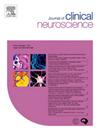Benefits and risks of antiplatelet therapy after bypass surgery for moyamoya disease: A meta-analysis
IF 1.9
4区 医学
Q3 CLINICAL NEUROLOGY
引用次数: 0
Abstract
Background
Bypass surgery is a leading treatment strategy for moyamoya disease. Antiplatelet therapy (APT) has the potential to prevent thrombosis and possibly enhance bypass graft patency. However, the efficacy and safety of APT following bypass surgery remain debatable. This study aims to assess the clinical outcomes of APT after bypass surgery.
Methods
A systematic review was conducted to evaluate the impact and associated complications of APT after bypass surgery. Electronic databases, including PubMed, Embase, and the Cochrane Library, were searched from their inception to September 1, 2023. The primary outcome was bypass patency.
Results
This meta-analysis included five articles, encompassing 480 patients who underwent APT post-surgery and 423 patients who did not receive APT. Statistical analysis revealed that APT significantly increased bypass vessel patency (Odds Ratio [OR] 2.58; 95 % Confidence Interval [CI] 1.51–4.43; P = 0.0006), decreased the likelihood of transient cerebral ischemic events (OR 0.55; 95 % CI 0.32–0.95; P = 0.03), and enhanced patient functional outcomes (OR 1.88; 95 % CI 1.29–2.74; P = 0.001). However, no substantial differences were observed in postoperative stroke risk (OR 0.89; 95 % CI 0.49–1.63; P = 0.72), seizures (OR 1.43; 95 % CI 0.61–3.37; P = 0.41), or cerebral hemorrhage (OR 0.69; 95 % CI 0.28–1.71; P = 0.42) between the two groups.
Conclusions
The current evidence indicates that APT after bypass surgery enhances bypass vessel patency, reduces the risk of transient cerebral ischemic events, and improves functional outcomes in patients. However, it does not decrease the incidence of postoperative stroke and does not elevate the risks of cerebral hemorrhage and seizures.
烟雾病搭桥手术后抗血小板治疗的获益和风险:一项荟萃分析
背景:搭桥手术是烟雾病的主要治疗策略。抗血小板治疗(APT)有可能预防血栓形成,并可能提高搭桥通畅。然而,旁路手术后APT的有效性和安全性仍有争议。本研究旨在评估搭桥术后APT的临床效果。方法:系统评价搭桥术后APT的影响及相关并发症。电子数据库,包括PubMed, Embase和Cochrane图书馆,从其成立到2023年9月1日进行了检索。主要结果为旁路通畅。结果:本荟萃分析纳入5篇文章,包括480例术后接受APT治疗的患者和423例未接受APT治疗的患者。统计分析显示,APT可显著增加旁路血管通畅(优势比[OR] 2.58;95%置信区间[CI] 1.51-4.43;P = 0.0006),降低了短暂性脑缺血事件的可能性(OR 0.55;95% ci 0.32-0.95;P = 0.03),增强了患者的功能结局(OR 1.88;95% ci 1.29-2.74;p = 0.001)。然而,术后卒中风险无显著差异(OR 0.89;95% ci 0.49-1.63;P = 0.72),癫痫发作(OR 1.43;95% ci 0.61-3.37;P = 0.41)或脑出血(or 0.69;95% ci 0.28-1.71;P = 0.42)。结论:目前的证据表明,旁路手术后APT可以增强旁路血管的通畅,降低短暂性脑缺血事件的风险,改善患者的功能结局。然而,它不会降低术后中风的发生率,也不会增加脑出血和癫痫发作的风险。
本文章由计算机程序翻译,如有差异,请以英文原文为准。
求助全文
约1分钟内获得全文
求助全文
来源期刊

Journal of Clinical Neuroscience
医学-临床神经学
CiteScore
4.50
自引率
0.00%
发文量
402
审稿时长
40 days
期刊介绍:
This International journal, Journal of Clinical Neuroscience, publishes articles on clinical neurosurgery and neurology and the related neurosciences such as neuro-pathology, neuro-radiology, neuro-ophthalmology and neuro-physiology.
The journal has a broad International perspective, and emphasises the advances occurring in Asia, the Pacific Rim region, Europe and North America. The Journal acts as a focus for publication of major clinical and laboratory research, as well as publishing solicited manuscripts on specific subjects from experts, case reports and other information of interest to clinicians working in the clinical neurosciences.
 求助内容:
求助内容: 应助结果提醒方式:
应助结果提醒方式:


